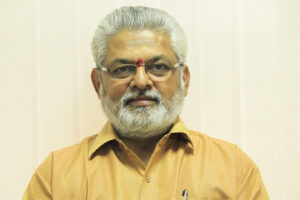
Team L&M
A practicing Ayurvedic physician, Dr GG Gangadharan (pic above), is currently the Director of M S Ramaiah Indic Centre for Ayurveda and Integrative Medicine, Bengaluru, Karnataka, India. A champion of Ayurveda for the past three and a half decades he has authored three research papers, 12 research articles, 13 primary papers and six books.
As a renowned expert on lifestyle diseases, he has conducted training programmes in the US, the UK, Germany, France, China, South Africa, Kenya, Nepal, Italy and Hong Kong, in addition to India.
The book talks about the main pillars of Ayurveda’s scientific logic. Dr Gangadharan points out that our bodies are intelligent systems designed to keep most diseases at bay, but we must pay more attention to the signals they give us. “Listening to our bodies allows for true restoration,” he says.
“Ayurveda (Penguin Ebury Press, Rs 240) is not an attempt to defend Ayurveda. I strongly believe that a sound, scientific framework of healthcare that has saved countless lives over 5,000 years, Ayurveda does not need any defender. Actually, it needs champions, and to be given wings,” he says.
Read on what more the author has to say:
When did the idea to pen this book come to you and how did as busy a medical professional as you are go about it?
I have been carrying the idea of this book for a long time and nurturing it with inputs out of my experiences over the years. I thought it is important that the concept of Ayurveda should reach the future generations in a language familiar to them. The whole book is on contemporisation of Ayurveda.
Regarding time, a passionate mind will always find time to do creative things irrespective one`s busy schedule. Of Course I was blessed with a talented team to help me with research data and technical references, which I have acknowledged in the book.
You say this book doesn’t seek to defend Ayurveda. What were the reasons that led to it needing “champions and be given wings” over 5,000 years later?
A sound scientific framework of healthcare that has saved countless lives of 5,000 years does not need defenders. It needs champions because the whole world is looking at Ayurveda for unanswered questions and unmet needs in healthcare. It has to reach out to 7.5 billion human beings most of whom are struggling to avail cost-effective quality healthcare. This book was born because the world needs it. It is time for the human species to sit up and notice unique blessings offered by Ayurveda.
Ayurveda practitioners have been seeking equivalence with Allopathic doctors in doing certain surgeries. Your comments…
Ayurveda as a science pioneered many surgical procedures, which are recorded in classical texts like Sushrutha Samhita in 2000 BC. Due to valid historical reasons there was erosion and weaknesses in the system which needs to be corrected. As of today, the training per se may be of low quality due to obvious reasons. The effort by the government to allow Ayurveda practitioners to become competent surgeons in specific (50 and odd) areas of uncomplicated surgery is a welcome step. This will make Ayurveda more competent and effective in the field. You may recall, in 2014 a prostate surgery was successfully done on an 80 year old man, replacing modern antibiotics with Ayurveda decoctions. Such innovations with adequate safety measures are possible once we get into integrative mode. So, I welcome this as a positive move. This I consider as a lateral growth of Ayurveda but real growth is when it grows from its roots. This has to be from its foundational principles.
Why do you think we have kept away from a science which has been with us for 5,000 years over a stream which is as recent as the early 19th century?
The development model after the independence adopted by Govt of India was based on Western reductionist science which has been politically dominating globally. While the Nehruvian idea of development has helped us achieve success in certain areas, it has done damage to indigenous knowledge system and indigenous notions of development. This has to change.
How do books such as yours help us?
This will give a real picture of scope and potential of Ayurveda while enthusing them to follow some of the aspects in their day to day life. Many people are looking for authentic explanations on concepts of Ayurveda in an easily comprehensible way. This book with a lot of anecdotes, examples and first-hand experiences satisfies a curious mind.